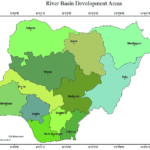T: +2347051423739

THE BLUE ECONOMY AND SUSTAINABLE DEVELOPMENT
Its estimated 50-85% of the oxygen production on Earth comes from the ocean: majority of which emanates from oceanic plankton — drifting plants, algae, and photosynthesizing bacteria. About 75 percent of the Earth’s surface is water-covered, and the oceans hold around 97 percent of all Earth’s water. The ocean also host an eclectic variety of geological processes responsible for the formation and concentration of mineral resources, serves as the ultimate repository of many materials shunted or dissolved from the land surface. The oceans contain vast amounts of materials that also serve as major resources for humans. Up to this point because of the economic challenge of it, direct extraction of resources from this gigantic reservoir is limited to salt, magnesium, placer gold, tin, titanium, and diamonds; and fresh water.
The aggregate use of the ocean is at the moment significantly tilted to the advantage of the more resourceful economies – from commercial fishing to large ocean transportation and mineral exploration. This underline the equal importance and why preservation of hinterland waters like rivers, lakes and basins cannot be overemphasized for a holistic integration of a Blue Economy. Incidentally, River Niger from which Nigeria derived its name is now a mere geographic representation as its nothing more than clusters of pond dotted along a valley where a river use to run. It’s ceased to be a navigable vein of the economy it once was for various reasons some of which is the mismanagement at the Sahel region in the North, climate change and the sheer number of people that relies on it as their primary source of water supply.
The United Nations Global Compact Sustainable Ocean Business Action Platform (founded July, 2000) convenes leading actors from business, academia and Government institutions to determine how ocean industries aka Blue Economy commerce can advance progress towards the Sustainable Development Goals (SDGs). The platform is also conceived to build upon the ten Principles of the UN Global Compact, which outline business responsibilities in the areas of human rights, labor, environment and anti-corruption (see below):
“Develop a “Framework for Leadership for the Global Goals and the Ocean” – facilitate the development of a business leadership framework on the ocean, seas and marine resources:
Inspire partnership and local action – expand successful existing partnerships at the country-level and foster innovative solutions to advance the implementation of the Global Goals through ocean sustainability:
Engage in advocacy and public policy – design policy advocacy toolkits on critical issues:
Map and gather new data – map industry-level impact on sustainable ocean development.”
The UN Global Compact Sustainable Ocean Business Action Platform is focused on growth, innovation and sustainability, exploring how to best protect the health of the ocean. It aims to mobilize the private sector to take tangible action, make investments and form partnerships to leverage the ocean as a resource to deliver the Global Goals.
Human existence and survival is 100 percent dependent on the ocean hence the management of this delicate relationship is fundamental to the hope of a sustainable human development. The ocean is vital to the well-being and prosperity of humankind. To achieve the global ambitions outlined in the SDGs, there is a necessity to expand the use of the ocean to produce food, energy and raw materials, as well as support transportation. To carry out these activities in a sustainable manner that will contribute to reducing global warming and environmental degradation. Today, threats such as overfishing, marine litter and acidification have put the health of the world’s ocean in a very fragile state. Maintaining healthy ocean environments is therefore a fundamental precondition for business to operate long-term, and addressing current challenges provides a significant business opportunity.
Businesses have a shared responsibility, alongside Government and civil society, to take necessary actions to secure a healthy ocean. By supporting research, development and deployment capabilities, and by engineering new products, services and business models, companies can negate harmful impacts on ocean ecosystems and contribute to their restoration.
As a resource for sustainable growth, renewable energy, food and climate action, protecting the health of our oceans, rivers and water basins holds significant potential to support the achievement of the Global Goals. Moreover, there is broad recognition that sustainable use of the ocean must go hand-in-hand with appreciation of life that exist under water.






